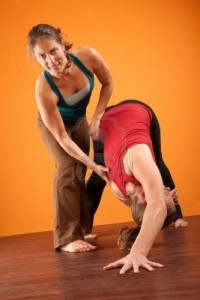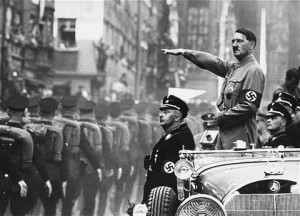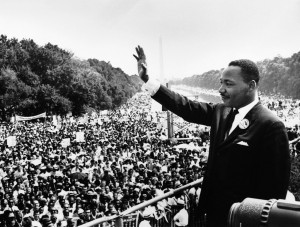Leadership, Power, and Touch
All of us have met someone we perceive as a “powerful” person. And each of us at one time or another has felt “powerful” in a situation. While there are many different ways to define and describe what we’re talking about here, one of my favorite working definitions for power in the realm of group dynamics and interpersonal relationships is this one: power is the ability to influence your environment.
 The ability to influence our environment manifests in many different ways. A particularly thoughtful writer might be able to influence the way people think, and so is acknowledged as a “powerful” influence on his culture. In a less benevolent way, a powerful dictator has tremendous influence in his environment, able to control the behavior of millions of people. Military power can not just influence–but utterly destroy–an environment.
The ability to influence our environment manifests in many different ways. A particularly thoughtful writer might be able to influence the way people think, and so is acknowledged as a “powerful” influence on his culture. In a less benevolent way, a powerful dictator has tremendous influence in his environment, able to control the behavior of millions of people. Military power can not just influence–but utterly destroy–an environment.
And on a happier note, an inspirational teacher might not merely influence a young person, but, later in life, that student might say: “I am who I am today, in part, because of the influence of that person.” Perhaps you yourself can name someone you consider a powerful role model. In some cases, powerful people have the ability to shape who we become.
We manifest power through thought that is expressed in spoken and written words; by our behaviors and the models that we offer others; through inspiration; through physical might, and in perhaps countless other ways. Touch, too, is a profound way in which we can influence our environment. Touch can be powerful.
 Perhaps you have had the experience of melting under the hands of a skillful masseur as he transformed the environment of your back from a nest of knots into warm putty. Somewhere in the midst of a yoga class today, the most gentle, subtle touch of an instructor on the shoulder of a student will help her move from “is this right?” to “aha! I get it!” during a particular pose. When we are struggling or sorrowful in our lives, an arm around our shoulder from a caring friend can accomplish more than a hundred words. We influence our environment using touch all the time.
Perhaps you have had the experience of melting under the hands of a skillful masseur as he transformed the environment of your back from a nest of knots into warm putty. Somewhere in the midst of a yoga class today, the most gentle, subtle touch of an instructor on the shoulder of a student will help her move from “is this right?” to “aha! I get it!” during a particular pose. When we are struggling or sorrowful in our lives, an arm around our shoulder from a caring friend can accomplish more than a hundred words. We influence our environment using touch all the time.
Those who are consistently able to influence their environment–to effect change–are often recognized as leaders. Leaders exert influence. So power and leadership already have a linkage, and today I’d like to add “touch” into that equation.
Leadership, power and touch come together in interesting ways for me in Touch Practice, and, I suspect, for anyone who uses touch in a significant way. I’d like to write about my own personal experience, and focus in on two aspects of this, which I’ve arbitrarily named “low-level leadership” and “high-level leadership.”
Low-level leadership involves the ability to project power. I try to shape my environment through my weekly blog, where I’m attempting to influence the way men think about touch, sexuality, orientation identity and community. I do workshops with groups where I attempt to influence them experientially. To the extent that someone’s thinking (or behavior) around touch shifts because of something I have written, or an experience I helped create, I have manifested power. I’ve had an impact on my environment–in this case, the people around me.
And that’s relatively unimportant, and a relatively inferior form of leadership, compared with high-level leadership.
 Low-level leadership merely projects power. Examples of powerful low-level leaders include people like Hitler and Stalin; they were able to project their personal power, extensively. With low-level leadership, you will notice that along with the projection of power onto people, the people themselves become less and less powerful. With dictators, the leaders get bigger and the people get smaller. The distance between the leader and the people gets bigger. The more effective a low-level leader is at projecting power, the more disempowered his people will become. Under the most formidable dictator, people feel utterly powerless. Paralyzed.
Low-level leadership merely projects power. Examples of powerful low-level leaders include people like Hitler and Stalin; they were able to project their personal power, extensively. With low-level leadership, you will notice that along with the projection of power onto people, the people themselves become less and less powerful. With dictators, the leaders get bigger and the people get smaller. The distance between the leader and the people gets bigger. The more effective a low-level leader is at projecting power, the more disempowered his people will become. Under the most formidable dictator, people feel utterly powerless. Paralyzed.
 High-level leadership, on the other hand, confers power. It conveys power. Examples of high-level leadership include people like Martin Luther King Jr. His ability to influence his environment worked in a different way–suddenly millions of people who felt previously powerless became empowered, mobilized. Rosa Parks sat herself down on that bus seat, and the world started to change. MLK Jr., like Gandhi, managed to get people focused not on the power their leader had, but rather, how much power they themselves had.
High-level leadership, on the other hand, confers power. It conveys power. Examples of high-level leadership include people like Martin Luther King Jr. His ability to influence his environment worked in a different way–suddenly millions of people who felt previously powerless became empowered, mobilized. Rosa Parks sat herself down on that bus seat, and the world started to change. MLK Jr., like Gandhi, managed to get people focused not on the power their leader had, but rather, how much power they themselves had.
Low-level leaders tell us: “I have the power to change the world.”
High-level leaders tell us: “YOU have the power to change the world.”
It happens from time to time that people perceive me as a guy who has some power around touch. They experience an individual practice or workshop with me and feel powerfully moved or influenced, or I’ve written something that has changed their thinking about something. That’s all well and good, but not terribly important, and not a very high standard.
The gold standard for Touch Practice, the best possible outcome, is when I finish a practice and a man will say, “wow, I feel so powerful right now.” When I see that a man has come into contact with his own beauty, his own power, his own strong sense of “I have a right to be here; I belong,” that always brings me great joy. That’s a kind of marker for me that things have gone well. It’s fine if he begins with the belief that the power is somehow in my touch, but in the end, we sort of miss the point if he doesn’t realize that the power actually resides in him.
And that gets us to some really important stuff about leadership. Remember, in the Hitler/Stalin example, that the better a leader is at projecting his own power, the less powerful his people feel?
Rule number one: the projection of power confers powerlessness. The more we try to convince, remind or prove to people that we are powerful, the less power they themselves will experience.
 You can see a great example of this in the classic “enabler/dependent” relationship that occurs in addiction. Try to convince someone that you can take care of them, make everything right in their world or fix their problems, and the more you project that power, the less powerful they become, until eventually, in your efforts to “lead,” you completely incapacitate them.
You can see a great example of this in the classic “enabler/dependent” relationship that occurs in addiction. Try to convince someone that you can take care of them, make everything right in their world or fix their problems, and the more you project that power, the less powerful they become, until eventually, in your efforts to “lead,” you completely incapacitate them.
Rule number two is the inverse, and it is both logical and baffling: the projection of powerlessness confers power. If you are in a position to sit with someone just as they are, and just as you are, with no intention to “fix” or “adjust” them, without opinions or judgments, “not knowing,” and simply be fully, intently present with them, they will discover and experience their own power, their own beauty. They will see it reflected in you, because you’re clear and quiet like a mirror.
When I do my best work with others in Touch Practice, I show up open, as clear of judgments or opinions and as receptive to the other person as I can be. I never come with anything remotely resembling a “treatment plan.” Touch Practice does not hold opinions about where men “need to go.” If I find myself with judgments or even hunches about my partner, I recognize those as invitations to failure and try to drop them as quickly as possible. If I ever get anywhere near the state of “diagnosing” my brother, all is lost. The power to move someone forward in their body resides within them, not within me. My job is to sit with it, watch it unfold, notice it, and reflect it.
The most effective high-level leadership comes not from the projection of personal power, but from a kind of hollowness that allows others to experience the power that comes from within them. Leadership of this kind is like a tube or pipe; it’s purpose is to conduct or transfer power rather than to generate or contain it.
 And as one moves from low-level leadership to high-level leadership, everything shifts: the need to be in control eases, and then vanishes into the illusion that it was to begin with. The tendency to exert the ego, to do, to make, to push, to steer, to shape, also diminishes, in favor of the far greater powers of seeing, listening, witnessing, holding space, being.
And as one moves from low-level leadership to high-level leadership, everything shifts: the need to be in control eases, and then vanishes into the illusion that it was to begin with. The tendency to exert the ego, to do, to make, to push, to steer, to shape, also diminishes, in favor of the far greater powers of seeing, listening, witnessing, holding space, being.
Doing is replaced with non-doing, in a way that is so paradoxical that, even as I write this, a piece of my brain is thinking, “this can’t be right. There’s no great leader who doesn’t DO. Great leaders DO.” Don’t they?
I suppose maybe they do. And then again, maybe they don’t.
Have thoughts you’d like to share?
Touch Practice is a sacred practice for me, and part of that is keeping confidences sacred. While a name and e-mail address are required to post a comment, feel free to use just your first name, or a pseudonym if you wish. Your e-mail address will never be seen by or shared with anyone. It is used to prevent spam and inappropriate comments from appearing in the blog. I’d really like to hear from you!














Kevin,
I really appreciated this message in particular but am thankful of them in general for their applicability to life outside of Touch Practice. Thank you so much for your wisdom and energy.
Ryan
Hey Ryan, thanks for reading and for writing in. Touch Practice has taught me a lot about touch but a lot about life, too. It’s amazing how much overlap there is between learning how to sit clearly with another person, and learning how to sit clearly with life. I’m happy there’s someone out there reading these things–thanks for telling me! Take care!
From my work in Touch Practice I have learned again that the power in the touch is that I have provided a path for someone to feel his own body. The touch brings him to himself, not to me.
Very well said, Tony. Thanks for this insight.
I do not mean to be sycophantic, Kevin, but by empowering people through Touch Practice, wouldn´t you fall on the second category rather than on the first one? (U don´t have to publish my commnet, it´s more like a question or a doubt.)
I sure hope I will! I guess history will be the judge of that, just as it has been for the other examples I’ve quoted. My sense is that’s not something we get to determine; history determines it after we goes.